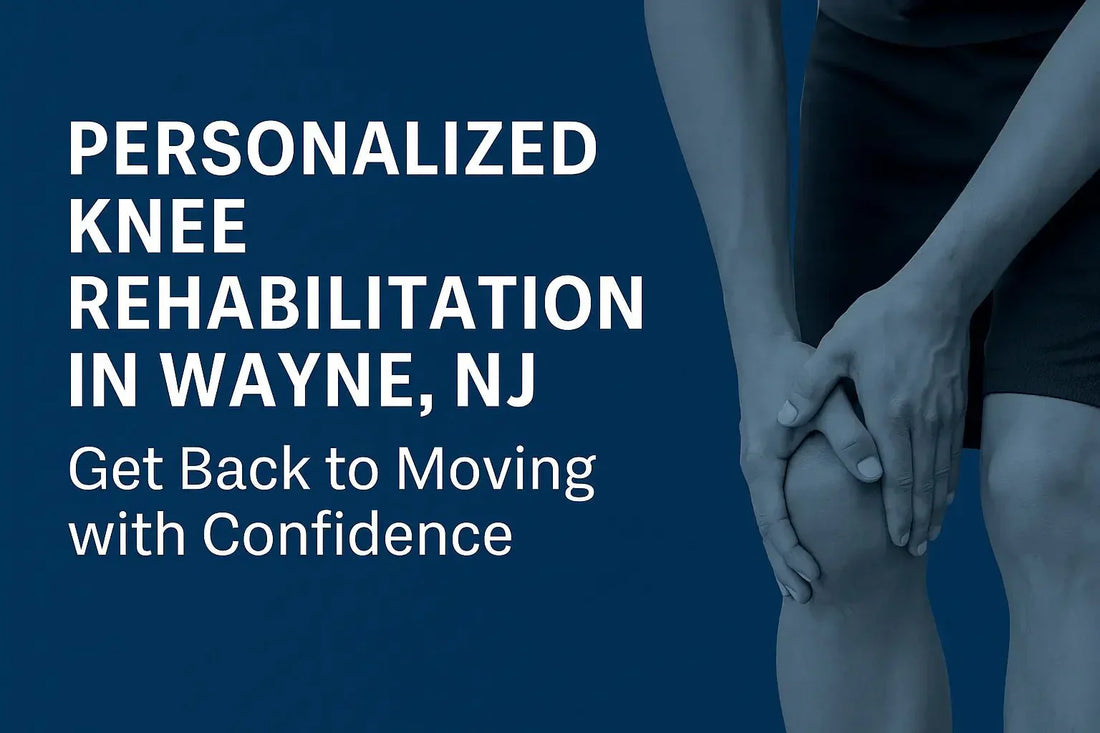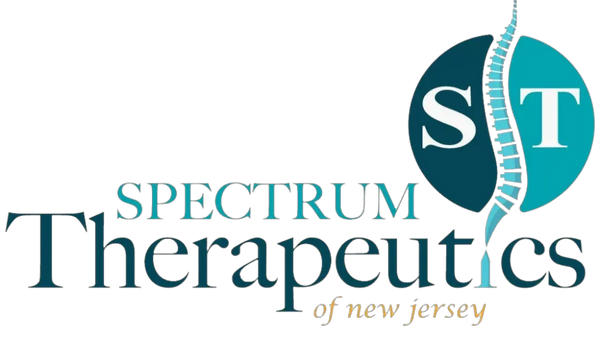
Personalized Knee Rehabilitation in Wayne, NJ: Get Back to Moving with Confidence
Dr. Rob Letizia PT, DPTShare
By Dr. Rob Letizia, PT, DPT | Spectrum Therapeutics of NJ – Wayne, NJ
Knee pain affects over 25% of adults and represents one of the leading causes of mobility limitations in the United States. Whether you're dealing with an acute sports injury, chronic arthritis, or post-surgical recovery, knee problems can significantly impact your ability to work, exercise, and enjoy daily activities. At Spectrum Therapeutics in Wayne, NJ, we've developed a comprehensive knee rehabilitation Wayne NJ program that consistently helps patients regain function, reduce pain, and return to active living without surgical intervention or long-term medication dependence.
The Complex Nature of Knee Injuries and Dysfunction
The knee joint is the largest and one of the most complex joints in the human body, functioning as both a hinge and a pivot point during movement. This remarkable joint must withstand forces up to six times your body weight during activities like running and jumping, while maintaining precise stability and mobility for daily functions.
The knee's intricate structure includes four major bones (femur, tibia, fibula, and patella), multiple ligaments (ACL, PCL, MCL, LCL), two menisci, extensive cartilage surfaces, and over a dozen muscles that cross the joint. When any component of this complex system becomes injured or dysfunctional, it can create a cascade of compensatory patterns that lead to further problems throughout the kinetic chain.
Common knee conditions we treat through our specialized knee rehabilitation Wayne NJ program include anterior cruciate ligament (ACL) tears, meniscus injuries, patellofemoral pain syndrome, osteoarthritis, rheumatoid arthritis, patellar tendinitis, iliotibial band syndrome, and post-surgical rehabilitation following knee replacement or arthroscopic procedures.
Evidence-Based Assessment: The Foundation of Effective Treatment
Successful knee rehabilitation begins with a comprehensive evaluation that identifies not only the primary problem but also the contributing factors that led to the injury or dysfunction. Our thorough assessment process examines biomechanical patterns, strength imbalances, mobility restrictions, and functional limitations that may be perpetuating your knee problems.
During your initial evaluation, we conduct detailed testing of knee joint range of motion, ligament stability, meniscus integrity, and patellofemoral tracking. We also assess hip and ankle function, as dysfunction in these adjacent joints frequently contributes to knee problems. Muscle strength testing focuses on the quadriceps, hamstrings, hip abductors, and calf muscles, while functional movement screening identifies compensatory patterns that may increase injury risk.
This comprehensive approach ensures that our knee rehabilitation Wayne NJ program addresses all contributing factors rather than simply treating symptoms. Research consistently demonstrates that addressing the entire kinetic chain leads to better outcomes and reduced recurrence rates compared to isolated knee-focused treatments.
Targeted Strengthening: Rebuilding the Foundation
Muscle weakness, particularly in the quadriceps and hip stabilizers, is both a cause and consequence of knee problems. Studies show that quadriceps strength can decrease by up to 20% within the first week following knee injury, and this weakness can persist for months or years without proper intervention.
Our progressive strengthening program targets all muscle groups that support knee function, with particular emphasis on:
- Quadriceps strengthening: Focused exercises for the vastus medialis oblique (VMO) and other quadriceps components to improve patellar tracking and knee stability
- Hip abductor strengthening: Targeting the gluteus medius and minimus to control femoral positioning during weight-bearing activities
- Hamstring development: Balancing quadriceps strength while improving knee flexion strength and ACL protection
- Calf muscle training: Enhancing gastrocnemius and soleus strength for improved push-off and shock absorption
- Core stabilization: Developing trunk control to minimize compensatory stress on the knee joint
The strengthening program is carefully progressed based on tissue healing timelines, pain levels, and functional goals. We utilize evidence-based loading principles to ensure optimal stimulus for muscle growth and strength development while protecting healing tissues.
Mobility and Flexibility: Restoring Optimal Movement Patterns
Restricted range of motion in the knee joint or surrounding structures can perpetuate pain, limit function, and increase injury risk. Our mobility-focused interventions target both passive range of motion restrictions and dynamic movement limitations that affect knee function.
Common areas requiring mobility work include knee flexion and extension range of motion, hip flexor flexibility, hamstring length, calf muscle extensibility, and iliotibial band mobility. We also address fascial restrictions and joint capsule limitations that may develop following injury or surgery.
Manual therapy techniques form an integral component of our mobility program, including joint mobilization to restore normal arthrokinematics, soft tissue mobilization to address muscle tension and trigger points, and myofascial release techniques to improve tissue quality and movement efficiency.
For patients with chronic knee stiffness, post-surgical adhesions, or conditions that have not responded adequately to conventional treatment, we may incorporate advanced shockwave treatment to break down scar tissue, improve tissue extensibility, and promote healing in targeted areas.
Functional Movement Training: Bridging the Gap to Real-World Activities
While isolated strengthening and mobility exercises are important, the ultimate goal of knee rehabilitation is to restore your ability to perform meaningful activities without pain or limitation. Our functional movement training program systematically progresses from basic activities of daily living to sport-specific or work-specific demands.
The progression typically begins with fundamental movement patterns such as squatting, lunging, and step-ups, performed with proper biomechanics and adequate knee control. As strength and confidence improve, we advance to more complex activities including jumping, cutting, pivoting, and sport-specific movements based on your individual goals.
Balance and proprioceptive training are essential components of functional rehabilitation, as knee injuries often result in decreased position sense and neuromuscular control. Research demonstrates that proprioceptive deficits can persist long after tissue healing is complete, contributing to reinjury risk and chronic instability.
Our comprehensive approach to physical therapy Wayne NJ integrates functional movement training with strength and mobility work to ensure optimal outcomes for patients with diverse knee conditions.
Specialized Treatment Approaches for Specific Knee Conditions
ACL Injury Rehabilitation
Anterior cruciate ligament injuries, whether treated surgically or conservatively, require specialized rehabilitation protocols based on current sports medicine research. Our ACL rehabilitation program follows evidence-based progressions that emphasize early range of motion, quadriceps strengthening, neuromuscular control, and gradual return to cutting and pivoting activities.
For athletes requiring surgical reconstruction, we provide comprehensive pre-operative conditioning to optimize surgical outcomes, followed by phased post-operative rehabilitation that typically spans 4-6 months for return to sport. Non-surgical ACL management focuses on maximizing quadriceps and hip strength to compensate for ligament deficiency while teaching activity modification strategies.
Meniscus Injury Management
Meniscus tears are among the most common knee injuries, particularly in adults over 40 where degenerative changes increase tear susceptibility. Our treatment approach varies based on tear type, location, and patient factors, with many meniscus injuries responding well to conservative management.
Conservative meniscus treatment emphasizes reducing mechanical stress on the joint through activity modification, strengthening the surrounding musculature to improve joint stability, and addressing biomechanical factors that may have contributed to the injury. For post-surgical cases, rehabilitation focuses on protecting the repair while gradually restoring function.
Patellofemoral Pain Syndrome
Often called "runner's knee," patellofemoral pain syndrome involves dysfunction in how the kneecap tracks over the thigh bone during movement. This condition is particularly common in young athletes and individuals with desk jobs who experience hip weakness and altered movement patterns.
Treatment focuses heavily on hip strengthening, particularly the gluteus medius and hip external rotators, combined with quadriceps strengthening that emphasizes the vastus medialis oblique. Movement retraining is crucial, teaching proper squatting, landing, and running mechanics to reduce patellofemoral stress.
Knee Osteoarthritis Management
Osteoarthritis affects millions of Americans and is a leading cause of knee pain and disability in older adults. While joint degeneration cannot be reversed, research consistently demonstrates that appropriate exercise and manual therapy can significantly reduce pain and improve function in people with knee arthritis.
Our arthritis management program emphasizes maintaining joint mobility, strengthening the quadriceps and hip muscles to support the joint, and teaching activity modification strategies to reduce symptom flares. Low-impact exercise options such as aquatic therapy may be incorporated to provide strengthening benefits while minimizing joint stress.
For patients with severe arthritis symptoms or those considering joint replacement surgery, our knee rehabilitation Wayne NJ program can help optimize function and potentially delay the need for surgical intervention.
Advanced Treatment Modalities for Complex Cases
For patients with chronic knee pain, complex conditions, or those who have not responded adequately to traditional rehabilitation approaches, we offer advanced treatment options that can provide significant benefits.
Blood flow restriction training allows for effective strengthening with reduced loads, making it particularly valuable for post-surgical patients or those with painful conditions who cannot tolerate traditional high-load exercises. This technique uses specialized cuffs to partially restrict blood flow during exercise, creating a metabolic environment that promotes strength gains with lighter weights.
Dry needling techniques can be particularly effective for addressing myofascial trigger points and muscle dysfunction around the knee. This treatment involves inserting thin needles into tight muscle bands to promote relaxation, improve blood flow, and reduce pain.
For chronic conditions such as patellar tendinopathy, chronic knee pain following surgery, or degenerative joint conditions that have not responded to conventional treatment, shockwave therapy can provide significant benefits. This non-invasive treatment uses focused acoustic waves to stimulate healing, break down scar tissue, and promote tissue regeneration.
Post-Surgical Knee Rehabilitation
Following knee surgery, whether arthroscopic repair, ligament reconstruction, or joint replacement, proper rehabilitation is crucial for optimal outcomes. Our post-surgical protocols are based on current orthopedic research and are customized based on the specific procedure, surgeon preferences, and individual patient factors.
Total knee replacement rehabilitation focuses on achieving full range of motion, restoring quadriceps strength, and progressing functional activities to enable independent living. Most patients can expect to return to normal daily activities within 6-12 weeks, with continued improvements in strength and endurance for several months.
Arthroscopic surgery rehabilitation varies significantly based on the procedure performed, ranging from relatively quick recovery for diagnostic procedures to extended protocols for complex repairs. We work closely with referring surgeons to ensure rehabilitation progresses appropriately while protecting healing tissues.
Prevention Strategies for Long-Term Knee Health
Prevention is always preferable to treatment, and many knee problems can be avoided through proper conditioning, movement mechanics, and activity modification. Our education programs teach patients evidence-based strategies for maintaining knee health throughout



